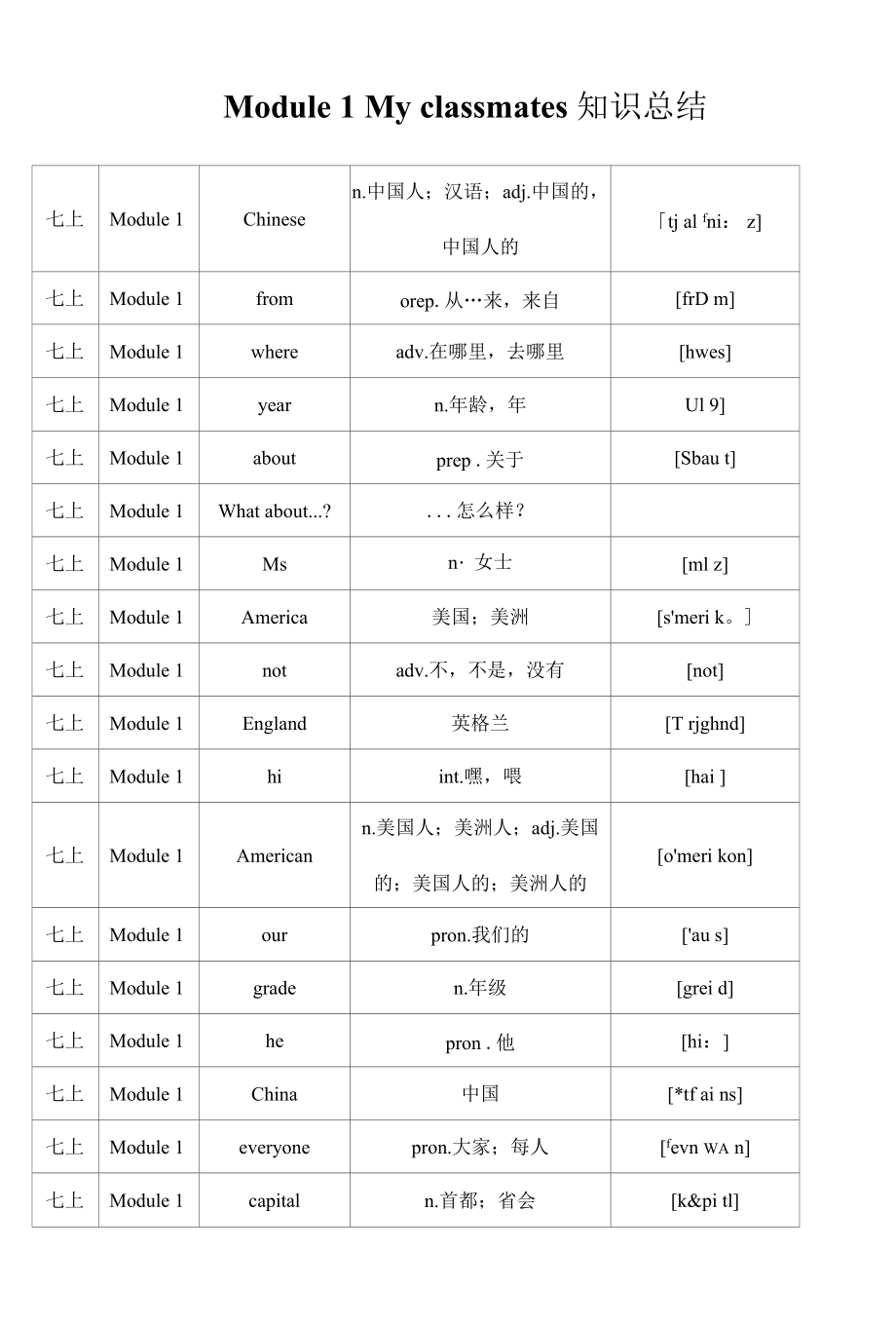《外研版七年級(jí)上冊(cè)英語(yǔ)Module 1 My classmates知識(shí)點(diǎn)總結(jié)》由會(huì)員分享�,可在線閱讀,更多相關(guān)《外研版七年級(jí)上冊(cè)英語(yǔ)Module 1 My classmates知識(shí)點(diǎn)總結(jié)(11頁(yè)珍藏版)》請(qǐng)?jiān)谘b配圖網(wǎng)上搜索����。
1����、Module 1 My classmates 知識(shí)總結(jié)
七上
Module 1
Chinese
n.中國(guó)人�;漢語(yǔ)��;adj.中國(guó)的��,
中國(guó)人的
「tj al fni: z]
七上
Module 1
from
orep.從…來(lái)����,來(lái)自
[frD m]
七上
Module 1
where
adv.在哪里,去哪里
[hwes]
七上
Module 1
year
n.年齡���,年
Ul 9]
七上
Module 1
about
prep .關(guān)于
[Sbau t]
七上
Module 1
What about...?
...怎么樣��?
七上
Mo
2�����、dule 1
Ms
n?女士
[ml z]
七上
Module 1
America
美國(guó)��;美洲
[s'meri k�。]
七上
Module 1
not
adv.不���,不是���,沒(méi)有
[not]
七上
Module 1
England
英格蘭
[T rjghnd]
七上
Module 1
hi
int.嘿�,喂
[hai ]
七上
Module 1
American
n.美國(guó)人�;美洲人;adj.美國(guó)
的�����;美國(guó)人的�����;美洲人的
[o'meri kon]
七上
Module 1
our
pron.我們的
['au s]
七上
Module
3����、 1
grade
n.年級(jí)
[grei d]
七上
Module 1
he
pron .他
[hi:]
七上
Module 1
China
中國(guó)
[*tf ai ns]
七上
Module 1
everyone
pron.大家;每人
[fevn wa n]
七上
Module 1
capital
n.首都���;省會(huì)
[k&pi tl]
�
七上
Module 1
but
conj.但是�,然而
[bA t]
七上
Module 1
very
adv.很�,非常
fveri]
七上
Module 1
big
adj.大的
[b
4、i g]
七上
Module 1
city
n城市
['si ti]
七上
Module 1
small
adj.小的
[smo : 1]
七上
Module 1
first
adj.第一(位)的�����,首要的����;
adv.先;首先
[f3 : st]
七上
Module 1
first name
名字
七上
Module 1
last
adj.最后的���,最末的���;adv.最
后,最末
[la: st]
七上
Module 1
last name
姓
七上
Module 1
all
pron.每個(gè)�����,全體
[���。:1]
1. be
5���、 from二come from 來(lái)自
Where are you from?= Where do you come from? 你來(lái)自哪里?
Where is he from?= Where does he come from? 他來(lái)自哪里��?
2. I am from Beijing. I am Chinese. 我來(lái)自中國(guó)����,我是中國(guó)人。
3. He is from England. He is English.
他來(lái)自英國(guó)��,他是英國(guó)人。
4. too; also
too位于肯定句句末���;also位于行前be后����;
I like apples
6���、, too. 我也喜歡蘋(píng)果��。
He is also a student. 他也是一名學(xué)生��。
5. Welcome sb to +地點(diǎn) 歡迎某人來(lái)到某地
You are welcomes Thafs Ok. = Thafs all right. =Not at all.不用謝
6. the capital of 的首都
7. family name=last name 女生 first name=given name 名
Bill Gates: Bill (first name/given name) Gates (family name/last name)
We
7�、 Chinese put family/last name first. 我們中國(guó)人把姓放在前面���。
8. with和(Be動(dòng)詞看前不看后) and和
Ann with her parents is in China. 安和她的父母在中國(guó)�����。
Ann and her parents are in China.
9.
人稱代詞主格
人稱代詞賓格
形容詞性物主代詞
名詞性物主代詞
I
Me
My
Mine
We
Us
Our
Ours
You
You
Your
Yours
She
Her
Her
Hers
He
Him
His
His
It
8��、It
Its
Its
They
Them
Their
Theirs
主格做主語(yǔ)��,放動(dòng)詞之前�����。賓格做賓語(yǔ)�,放動(dòng)詞和介詞之后
形代+名詞=名代?���。ㄕl(shuí)的)
She is a good teacher. We like her. 她是一名好老師,我們喜歡她���。
Give him a toy, please. 請(qǐng)給他一個(gè)玩具��。
Our eyes are black. We are from China.我們的眼睛是黑色的�,我們來(lái)自中國(guó)����。
My uncle buys a new bike for me.我叔叔給我買了一輛新自行車。�
Most of them like Chin
9���、ese food. 他們大多數(shù)都喜歡中國(guó)菜���。
重點(diǎn)句型:
What is your name?AVhat is his name?/ What is her name?
你的/他的/她的名字是什么?
My name is.../His name*s .../ Her name is ...
我的名字/他的名字/她的名字是.....
How old are you? How old is he?/How old is she?
你/他/她多大?
How/What about + 名詞/動(dòng)詞 ing ?
......怎么樣�?
What class are you in? I a
10、m in Class Seven.
你在幾班���? 我在七班���。
What grade are you in? I am in Grade Seven.
你在幾年級(jí)? 我在七年級(jí)���。
一���、單詞
1. Chinese n.漢語(yǔ);中國(guó)人
adj.中國(guó)的���,中國(guó)人的
(1) 作“語(yǔ)文,漢語(yǔ)”講時(shí),為不可數(shù)名詞�;作“中國(guó)人"講時(shí),為可數(shù)名詞,單復(fù)數(shù)形式相同����。
Eg. He can speak a little English.他能說(shuō)一點(diǎn)英語(yǔ)。
We are all Chinese.我們都是中國(guó)人�。
(2) 作為“中國(guó)的,中國(guó)人的”講時(shí)�,為形容詞�。在句中作定語(yǔ)和表語(yǔ)���。
eg. Tm Chin
11��、ese.我是中國(guó)人�。
fm a Chinese student.我是一名中國(guó)的學(xué)生�。�
2. American n.美國(guó)人;美洲人
Adj.美國(guó)的���;美國(guó)人的;美洲的
2. welcome v.歡迎 adj.受歡迎的
(1) “歡迎”
welcome sb. to..."歡迎某人到 "
eg. Welcome you to China.歡迎你來(lái)到中國(guó)����。
(2) “受歡迎的”
① 作為形容詞在句中常做表語(yǔ)
eg. You are welcome here.你在這兒是受歡迎的。
② 用作答謝的客套話��,表示“不客氣�,別客氣"
eg.一Thank you!謝謝你! 一You ar
12�����、e welcome!不客氣����!
3. too adv.也����;太
(1) 表示“也”����,常放在肯定句句尾,表示某情況也適合某人���,句尾常用逗號(hào)隔開(kāi)��。
eg. Em a student, too.我也是一名學(xué)生�。
(2) 表示“太”�,修飾形容詞或副詞的原級(jí)。
eg: The room is too big.這個(gè)房間太小了�。
二、 基本句型
1. ---What's your name?你叫什么名字�����? ---My name is.../rm ...我是
2. …Where are you from?/Where do you come from?你來(lái)自哪里�����? ---I'm from.../
13、
I come from...我來(lái) 自...
3. --- How old are you?你多大了? ---Fm...years old. / I'm…我… 歲了�。
4. ---Nice to meet you!很高興見(jiàn)到你。---Nice to meet you, too.我也很高興見(jiàn)到你�。
5. ---How do you do?您好(初次見(jiàn)面)---How do you do?您好
三、 語(yǔ)法
1. 系動(dòng)詞be的用法:
am用于第一人稱I后;is用于第三人稱單數(shù)后;are用于第二人稱you及各種人稱復(fù)數(shù)
口訣:I是am you是are is用于he, she, it,復(fù)
14�����、數(shù)形式全用are
2. 肯定陳述句變一般疑問(wèn)句的句式:
(1) be+主語(yǔ) + eg: Are you a student?
(2) 情態(tài)動(dòng)詞(can) + 主語(yǔ) + 動(dòng)詞原形 + eg: Can you speak English?
(3) 助動(dòng)詞(do, does, did) + 主語(yǔ) + 動(dòng)詞原形+ eg: Do you like English?
3. 代詞:
(1) 人稱代詞:
主格:I we you you he she it they (做主語(yǔ))
賓格:me us you you him her it them (作賓語(yǔ)/表語(yǔ))
(2) 物主代詞:
形容
15����、詞性物主代詞:my our your your his her its their (做定語(yǔ))
名詞性物主代詞:mine ours yours yours his hers its theirs (作定語(yǔ)以外成分)
名詞性物主代詞=形容詞性物主代詞+名詞eg: mine = my book
四、知識(shí)拓展
1. What about/ How about. ..的用法
⑴What about you = How about you用來(lái)詢問(wèn)對(duì)方或第三者對(duì)前面所討論話題的看法����。
eg. I want to listen to some music. What /How about you
16�、? 我想聽(tīng)點(diǎn)音樂(lè),你呢?
(2) What about = How about + n./pron./v-ing 表示“怎么樣”用來(lái)提 出建議或請(qǐng)求�����。
eg: How about listening to some music?聽(tīng)點(diǎn)音樂(lè)怎么樣呢����?
How about some apples?吃些蘋(píng)果怎么樣����?
2. Nice to meet you! = It's nice to meet you!
Glad to meet you! = I'm glad to meet you!
Happy to meet /see you!= I'm happy to meet /see you
17��、!
3. 在英語(yǔ)中�,英美名字在前,姓在后��;而中國(guó)的人名姓在前����,名在后。first name = give name名
字,last name = family name 姓���,Middle name 中間名字
eg. Gorge Washington Bush
first name Middle name family name
4. 表示某年級(jí)班級(jí)時(shí)���,先說(shuō)班級(jí)再說(shuō)年級(jí),class和grade首字母大寫(xiě)���。
eg: I'm Class 1 Grade 2. 我在二年級(jí)一班���。�
颶當(dāng)舞結(jié)3
來(lái)自
be from=come from
很高興見(jiàn)到你
nice to meet you
18、
練習(xí)說(shuō)英語(yǔ)
practice speaking English
在一班
in Class One
在黑板上寫(xiě)字
write on the blackboard
姓
family name
名
given name
第一節(jié)英語(yǔ)課
the first English lesson
我的/你的名字
my/your name
一個(gè)大城市
a big city
好朋友
good friends
幾歲
how old
十三歲
thirteen years old
在我班
in my class
讀書(shū)
read a book=read books
中文名字
Chinese name
英文名字
English name
�
一個(gè)新學(xué)生
a new student
介紹你自己
introduce yourself
 外研版七年級(jí)上冊(cè)英語(yǔ)Module 1 My classmates知識(shí)點(diǎn)總結(jié)
外研版七年級(jí)上冊(cè)英語(yǔ)Module 1 My classmates知識(shí)點(diǎn)總結(jié)

